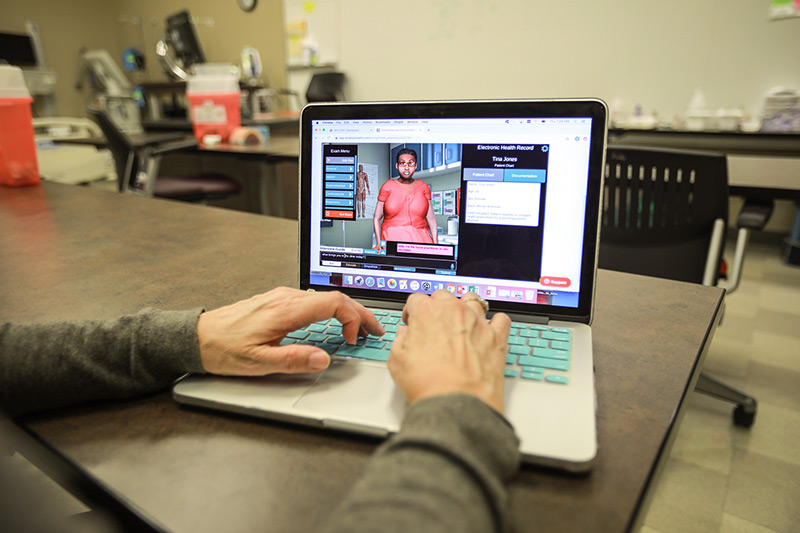UTEP Nurse Practitioner Students Practice on Virtual Patients
Last Updated on October 21, 2019 at 12:00 AM
Originally published October 21, 2019
By Laura L. Acosta
UTEP Communications
In the Shadow Health examination room, Tina Jones, a 28-year-old woman with diabetes, complained of a sore throat and itchy and runny nose.

“These symptoms are driving me nuts,” Jones quipped, as she balanced herself on top of the exam table in a blue patient gown.
“I’m sorry you’re not feeling well,” said Fukamanji Sikazwe, a graduate student in the Nurse Practitioner (NP) program at The University of Texas at El Paso, while assessing Jones’ condition. “We are here to try to get you to feel better.”
“Thanks,” Jones replied.
Despite exhibiting real-life symptoms, Jones is a virtual patient created by Shadow Health, an educational software developer of learning environments termed Digital Clinical Experiences (DCEs).
For more than a year, nurse practitioner students in UTEP’s Master of Science in Nursing program, have practiced their communication, physical assessment, and documentation skills on human-like avatars through Shadow Health DCEs.
“Students can safely interview patients, examine them, and take care of their patients in a digital environment,” said Sondra Skory, DNP, assistant clinical instructor and Shadow Health course coordinator. “This allows them to build confidence and expertise before interaction with real patients. Students learn how to develop the needed critical thinking skills, as well as refine their physical assessment skills.”
UTEP’s nurse practitioner program prepares registered nurses beyond their initial professional training to provide a higher level of patient care. Future nurse practitioners such as Sikazwe will be able to examine patients, diagnose and treat acute and chronic illnesses, and prescribe medications and other therapeutic modalities.
To maximize their clinical education, Shadow Health DCEs have been incorporated into their advanced health assessment and pharmacology coursework.
According to the Shadow Health Instructional Design and Training team, the DCE is developed with leading-edge technology, including a state-of-the-art conversation engine and interactive 3D imagery to provide students with practice opportunities in a safe learning environment.
Students receive individualized feedback on their developing skills, including therapeutic communication, patient examination, and patient education and empathy.
“Shadow Health has helped shape my approach to performing a physical assessment and I feel very comfortable performing certain tests and assessments,” Sikazwe said.
Students log into one of nine Shadow Health modules - health history, HEENT (head, eye, ear, nose and throat), respiratory, cardiovascular, gastrointestinal, musculoskeletal, neurological, mental health, and comprehensive assessment.
In the exam room, they were introduced to Tina Jones, who is one of several virtual patients students interacted with.
They typed questions or statements in the program’s chat box such as “How are you feeling today?” and “When did your symptoms start?” to communicate with her.
Jones has a language capacity of 128,000 words and can verbally respond to hundreds of questions.
During the conversation, students were expected to educate and empathize with Jones in order to increase her health literacy and sense of well-being.
“They learn to effectively communicate with patients using basic, everyday language, which is vital to the proper diagnosis and treatment of patients,” said Guillermina Solis, Ph.D., assistant professor of nursing and coordinator of the Family Nurse Practitioner (FNP) program. Solis was among the first School of Nursing faculty members to incorporate Shadow Health DCEs into the advanced health assessment course.
In Shadow Health’s Concept Labs, students explored multiple body systems and performed respiratory, abdominal, or cardiovascular exams. They listened to real body sounds and looked at realistic, 3D anatomical body models such as the heart and lungs to compare and contrast normal and abnormal findings.
After obtaining Jones’ health history and performing a physical exam, students were responsible for identifying a diagnosis and creating a treatment plan.
“I liked how well structured (the DCE) was and how real the virtual patients are,” said nurse practitioner student Raudel Melchor, who also liked that the online program could be accessed at any time on his laptop at home or at work. “(The patients were) very detailed and (had) good dialogue.”
Shadow Health’s success in the health assessment course prompted UTEP Clinical Assistant Professor Elizabeth A. Portugal, DNP, to integrate the program into the advanced pharmacology course. It will expand to the advanced pathophysiology course in January 2020.
In one scenario, students prescribed antibiotics and other appropriate medications to treat Doris Turner, an 86-year-old woman with community acquired pneumonia. After administering the medication, they evaluated Turner’s condition for expected outcomes and adverse effects.
Sikazwe said the opportunity to practice writing prescriptions has helped him to better understand what is expected of her him in the clinical setting.
“The medication lectures in Shadow Health were very helpful as the program has a way of depicting the human body response once a medication enters the body,” he said. “That really guided a lot of my learning and understanding of the physiology behind certain medications, especially antihypertensives and antidiabetic medications”
Portugal has been integrating simulation learning into online teaching for more than 10 years.
She said that clinical learning experiences such as Shadow Health help to transition students from their roles as bedside nurses to advance practice nursing.
“When you’re at the bedside, you’re administering a medication prescribed by the provider,” Portugal said. “But as a provider, you’re taking on the responsibility of prescribing the medication. You have to look at the entire picture of the patient. What are they allergic to? What am I diagnosing them with? Where in the pathophysiology is this disease process or infection happening? (Shadow Health) is helping you evolve into a different role.”